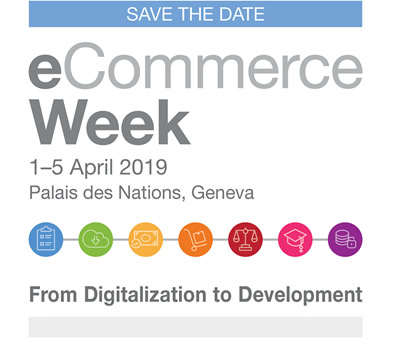Building an inclusive digital economy with local business communities
2 Apr 2019 10:00h - 11:30h
Event report
[Read more session reports and live updates from the UNCTAD E-commerce Week]
The session, organised by the Center for International Private Enterprise (CIPE), was introduced and moderated by Ms Louisa Tomar Global (Program Officer, Center for International Private Enterprise (CIPE)). While the evolution and innovation in e-commerce and fintech has enhanced productivity and improved livelihoods, small and local businesses have not been able to fully capitalise on the opportunities created by such technological innovation. With insights and experiences from Jordan, Kenya, Tunisia and Export Portal Inc., the session explored the barriers that small and medium sized enterprises (SMEs) are facing in the digital economy, and how different stakeholders can work together in addressing these challenges.
Mr Nidal Bitar (CEO, ICT Association of Jordan) introduced the activities of the ICT Association of Jordan by focusing on topics that would improve the business environment, such as policy advocacy, collaboration with all stakeholders, and working with start-ups and entrepreneurs. Bitar stressed the importance of improving export, human capital, access to finance, and the digital economy, while promoting the use of information and communications technologies (ICTs) in all sectors. He then focused on the current e-commerce landscape of Jordan that needs more financial inclusion to foster opportunities for fintech. The country founded a fintech council as an umbrella for all start-ups and fintech companies in Jordan. Another gap that needs to be bridged is the lack of e-commerce laws. He added that the regulation of e-commerce initiatives would increase the need for consumer protection, especially since e-commerce in Jordan is mainly driven through social media platforms. The constant growth in the transaction of goods requires clearer regulations on issues such as taxation.
Ms Ally Spinu (CEO, Export Portal Inc.) talked about the use of blockchain for supporting SMEs on a global scale by ‘holding information about practical situations’. She added that Export Portal Inc. connects SMEs with stakeholders, gives them accreditation, and tracks all stages of production of a good, throught the use of a digital identity. The main barriers for trade facilitation that small businesses face are related to risks, access to finance, and the fear of entrepreneurs to expand to the global market.
Mr Khabbab Hadhri (Director, E-commerce Ministry of Trade, Tunisia) talked about the e-commerce landscape in Tunisia. The country is actively informing the public on the necessary precautions regarding online purchasing, and is working with international organisations on tackling challenges posed by e-commerce. He reminded the participants of the established ministry for ICT and the digital economy, as well as the Tunisia Digital 2020 strategy.
Ms Grace Githaiga (Convenor, KICTANet) said that KICTANet is a multistakeholder network reforming ICTs in Kenya. The objective of the company is to improve the effectiveness of ICTs and expand the country’s regulatory framework. KICTANet carries out research and provides policy briefs, promotes advocacy on its platform, and enhances capacity building through digital security policy advocacy. The country’s e-commerce landscape is characterised by a large presence of SMEs that account for 3% of the national gross domestic product (GDP). Moreover, Kenya has increasingly adopted new payment methods through online applications, which has fostered the fintech market, but raised concerns on SMEs becoming new data controllers. Many SMEs are handling a large amount of personal data through the use of mobile payment apps, not realising that through enabling payments, they become data controllers. In order to effectively move from digitisation (the shift from analogue to digital) to digitalisation (a change in business models and value production opportunities), there has to be improvement in capacity building to ensure the highest level of data protection. Additionally, more efforts are needed in tackling cybercrime related to mobile money transaction.
Mr Cedric Atangana (Co-founder and CEO, We Cash Up) concluded the session with a presentation of We Cash Up, a digital and worldwide applicable payment system.
By Stefania Grottola
Related topics
Related event

eCommerce Week 2019: From Digitalization to Development
1 Apr 2019 15:45h - 5 Apr 2019 15:45h
Geneva, Switzerland
